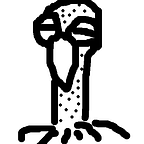You know, it used to be a sin.
In the Middle Ages.
But curiosity has come a long way: From the pyre into its own university. Curiosity-based education means: Don’t cram knowledge into students’ heads! Don’t lecture! Start with the students’ own questions and interests, then respond. Let students be active, let them lead the way; you guide them to the right materials, methods and ideas. That way students always see why they need to learn what they learn, and thus shall be motivated intrinsically. And as they do so, they are also learning how to to learn — which is more important than any knowledge itself (which is, as we know, temporary anyway).
And so this university has set out under the flag of curiosity to disrupt the old, traditional education system and build more passion, creativity and competence with our new technology- and startup-inspired ideas of self-driven project work. This is new! At least as new as Rousseau’s Émile. Or, well, ok — maybe Augustine’s de magistro. And of course Plato’s maeutics. He invented that, no?
Speaking of Plato, have you ever heard of Meno’s paradox? It states that seeking knowledge is actually impossible. If you already know what you are seeking, you don’t have to seek it. And if you don’t know what you are seeking — how would you recognise it when you saw it? Curiosity, it seems, suffers from a similar plight. It hits you when you have a bunch of preferrably inexperienced students in a silent room — and they have no idea which question they should ask. We cannot pull the whole world of knowledge from our head, or even someone else’s head, if we don’t have anything to go about. We can only be curious about what we know, not about something we don’t know to exist. How to ask a question is actually a form of knowledge, too.
So curiosity is a funny little thing. It has its own “dialectics” as they used to say: It can turn against what it was meant to be. It requires its own opposite: some hard knowledge. And so the trick is to slip a piece of knowledge to the students every now and then, when nobody’s looking, while sticking with the official pose of being passive. Again, like Plato. Or Socrates, actually.
But don’t get me wrong (and please don’t fire me!): I still believe! We all do, more than ever. Only that we, who work at the frontlines of curiosity-based education, are struggling day by day with its dialectics. The paradox is necessary. And therefore we are trying to juggle the idea of self-propelled learning with the fact that hard knowledge still matters and has to come from somewhere.
But this is only one of two problems of curiosity. One problem is what we make of it in teaching, one is what we make of it in learning. Curiosity is not knowledge itself, but a relationship towards it. Actually not so unlike philo-sophia. And it is a relationship of willingness. Curiosity is not just doing what you want. It’s more like wanting what you do. A common road to failure at CODE is thinking that finally you get to learn only what you like, and only work when you feel like it. It took me a while to learn this myself: Curiosity is not your whims and wishes. It’s a virtue.
What does that mean?
Be curious! It’s funny, that we can actually say that to each other. We can make ourselves into a curious person, and we can demand curiosity from others. The uninitiated, when they describe themselves as a curious person, tend to treat curiosity as a naturally given character trait. And that’s certainly true, too. Actually the 5-Factors-Model of personality speaks in favour of that. There certainly are differences between people with regard to being open to experience. But not even personalities are completely fixed. Curiosity can be trained — and it should be. That’s the whole point. You can act interested, and that makes you more interested, from outside in. So don’t confuse curiosity with desire. Or do confuse it. Because after all, desire, too, can be trained.
Disclaimer: I actually am doing the Middle Ages injustice here, and only for a cheap rhetorical effect. Pyres, witch burning and the inquisition actually came up only in early modernity
